Analysing Organisational Behaviour: A Report on Debenhams' Culture
VerifiedAdded on 2023/01/04
|10
|3118
|435
Report
AI Summary
This report provides an analysis of organisational behaviour within Debenhams, a multinational retailer. The study delves into the company's culture, identifying it using the Handy model and exploring how it impacts organisational effectiveness, with a focus on communication. The report further examines the role of culture in motivating employees, referencing Maslow's hierarchy of needs, and investigates how Debenhams can leverage its culture to enhance its success. The report covers topics such as team effectiveness, the importance of soft and hard skills, and the significance of a positive work environment. It emphasizes the importance of innovation, employee satisfaction, and the application of various theoretical models to understand and improve organisational dynamics. The report concludes with an overview of the factors that contribute to building a successful and engaging corporate culture.
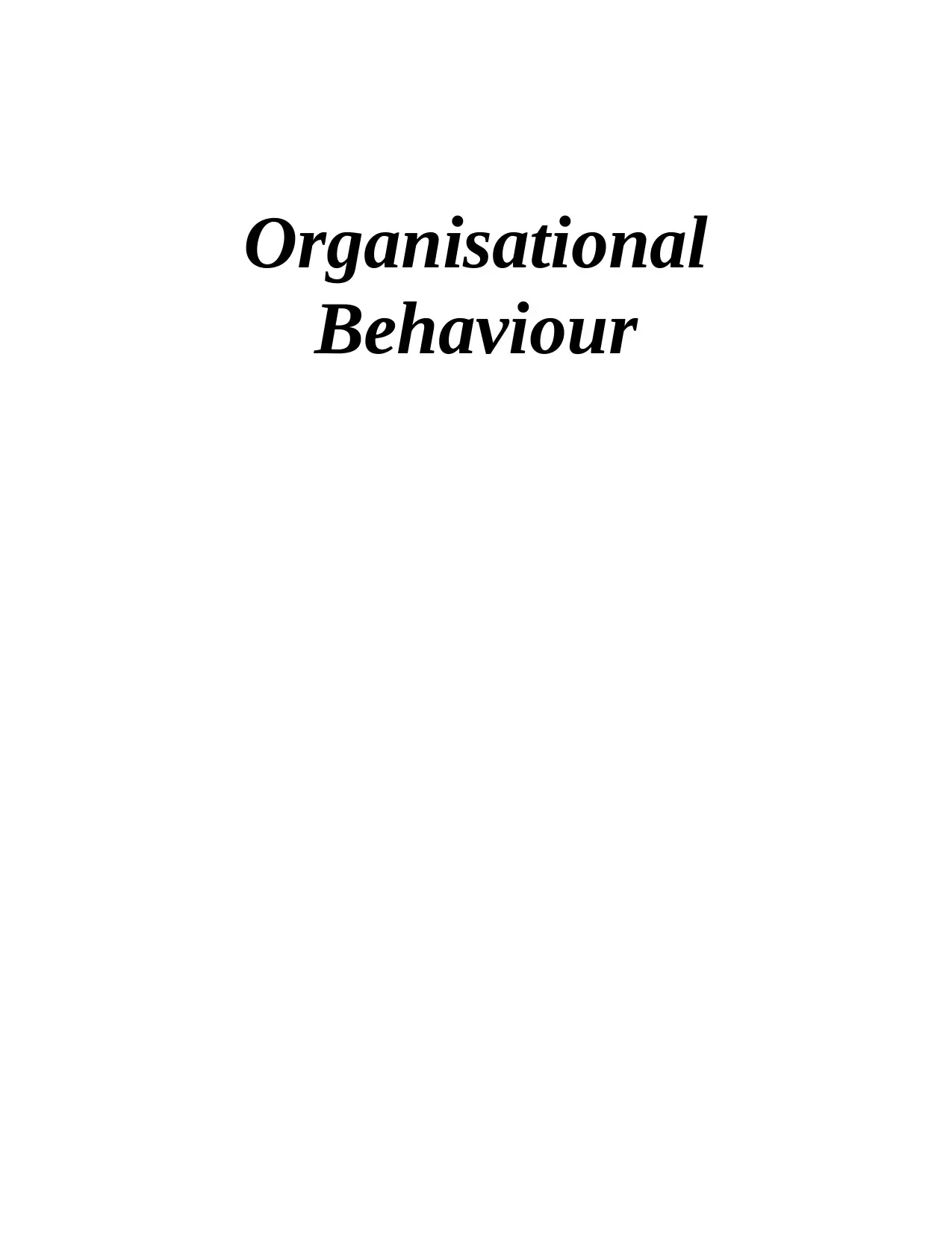
Organisational
Behaviour
Behaviour
Paraphrase This Document
Need a fresh take? Get an instant paraphrase of this document with our AI Paraphraser
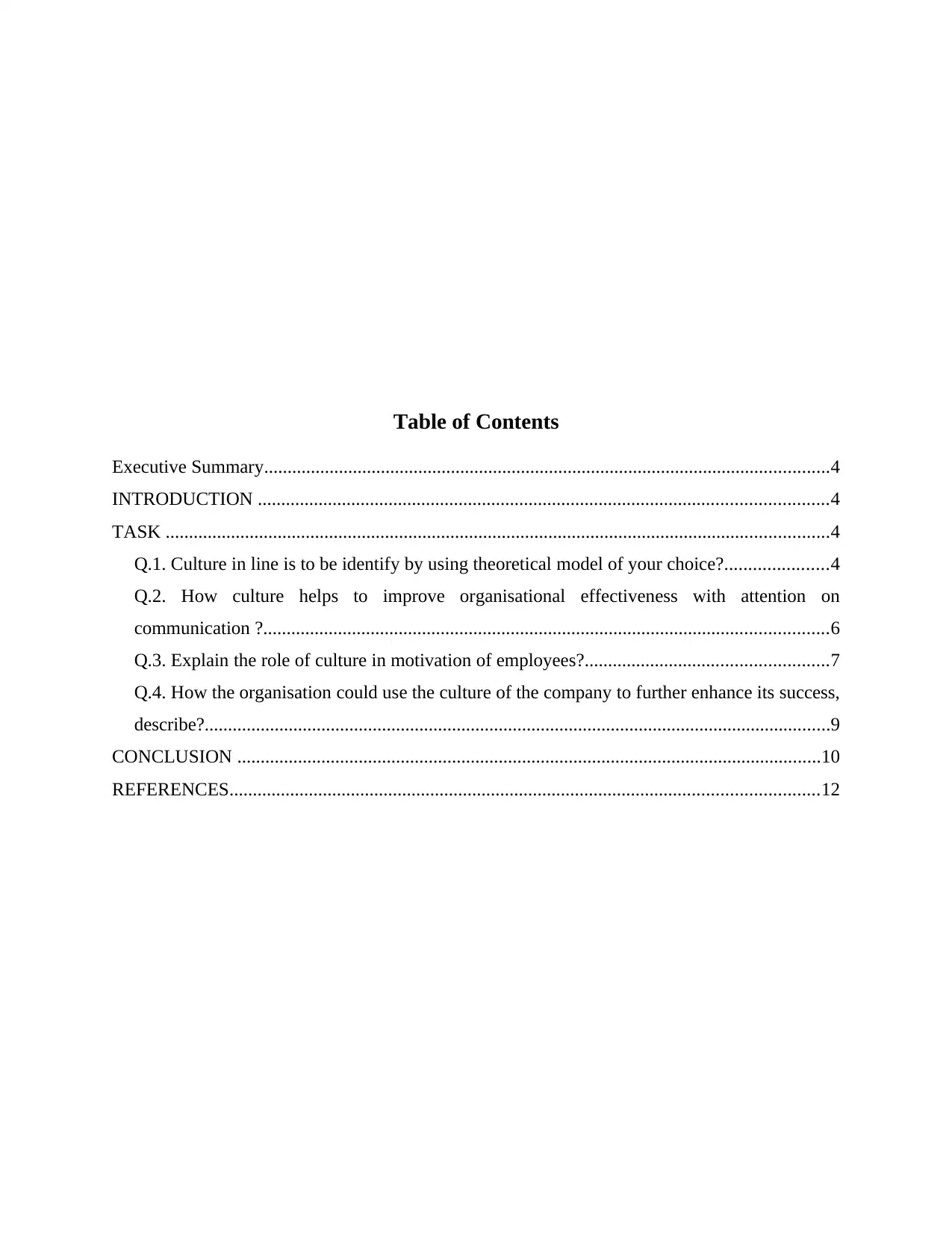
Table of Contents
Executive Summary.........................................................................................................................4
INTRODUCTION ..........................................................................................................................4
TASK ..............................................................................................................................................4
Q.1. Culture in line is to be identify by using theoretical model of your choice?......................4
Q.2. How culture helps to improve organisational effectiveness with attention on
communication ?.........................................................................................................................6
Q.3. Explain the role of culture in motivation of employees?....................................................7
Q.4. How the organisation could use the culture of the company to further enhance its success,
describe?......................................................................................................................................9
CONCLUSION .............................................................................................................................10
REFERENCES..............................................................................................................................12
Executive Summary.........................................................................................................................4
INTRODUCTION ..........................................................................................................................4
TASK ..............................................................................................................................................4
Q.1. Culture in line is to be identify by using theoretical model of your choice?......................4
Q.2. How culture helps to improve organisational effectiveness with attention on
communication ?.........................................................................................................................6
Q.3. Explain the role of culture in motivation of employees?....................................................7
Q.4. How the organisation could use the culture of the company to further enhance its success,
describe?......................................................................................................................................9
CONCLUSION .............................................................................................................................10
REFERENCES..............................................................................................................................12
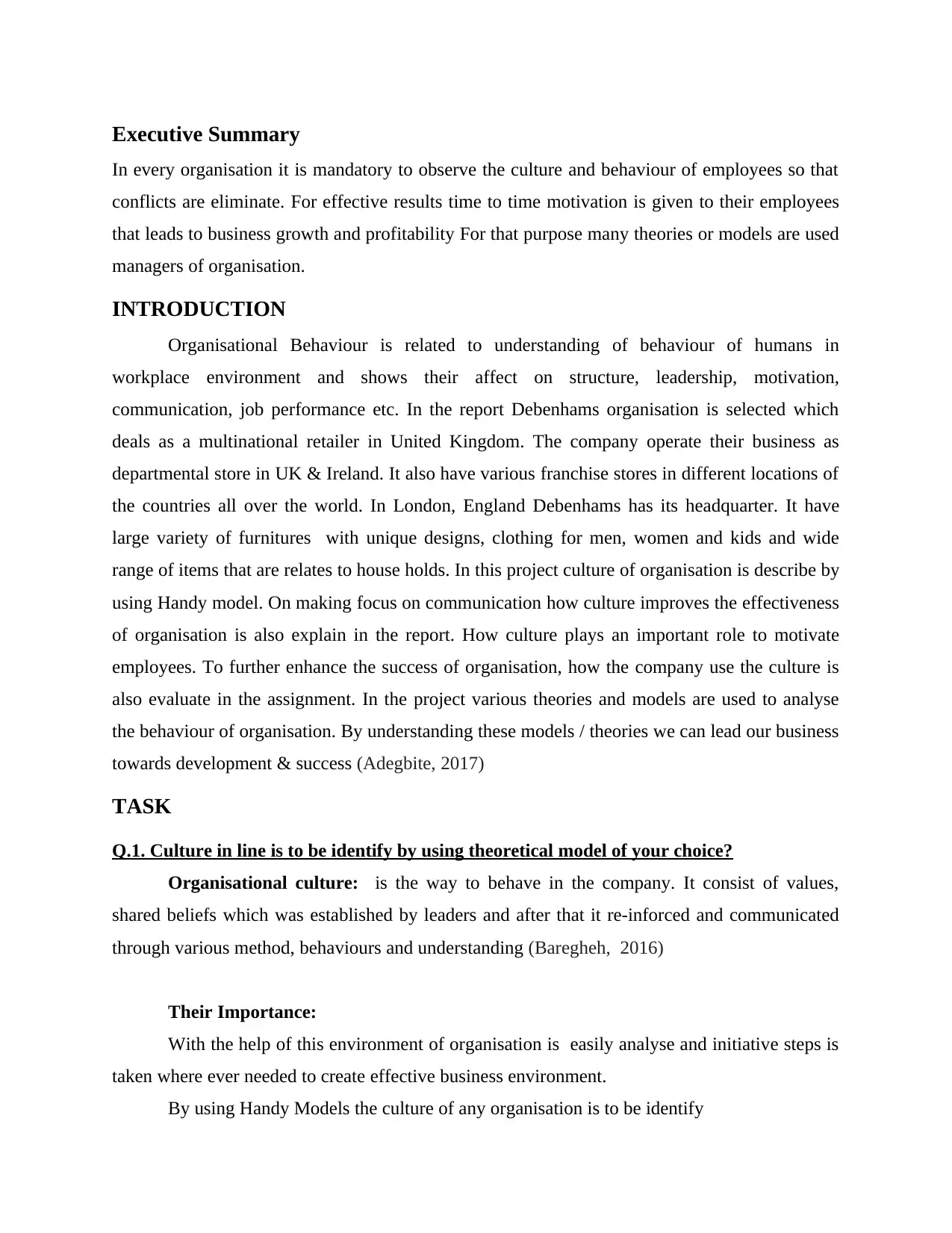
Executive Summary
In every organisation it is mandatory to observe the culture and behaviour of employees so that
conflicts are eliminate. For effective results time to time motivation is given to their employees
that leads to business growth and profitability For that purpose many theories or models are used
managers of organisation.
INTRODUCTION
Organisational Behaviour is related to understanding of behaviour of humans in
workplace environment and shows their affect on structure, leadership, motivation,
communication, job performance etc. In the report Debenhams organisation is selected which
deals as a multinational retailer in United Kingdom. The company operate their business as
departmental store in UK & Ireland. It also have various franchise stores in different locations of
the countries all over the world. In London, England Debenhams has its headquarter. It have
large variety of furnitures with unique designs, clothing for men, women and kids and wide
range of items that are relates to house holds. In this project culture of organisation is describe by
using Handy model. On making focus on communication how culture improves the effectiveness
of organisation is also explain in the report. How culture plays an important role to motivate
employees. To further enhance the success of organisation, how the company use the culture is
also evaluate in the assignment. In the project various theories and models are used to analyse
the behaviour of organisation. By understanding these models / theories we can lead our business
towards development & success (Adegbite, 2017)
TASK
Q.1. Culture in line is to be identify by using theoretical model of your choice?
Organisational culture: is the way to behave in the company. It consist of values,
shared beliefs which was established by leaders and after that it re-inforced and communicated
through various method, behaviours and understanding (Baregheh, 2016)
Their Importance:
With the help of this environment of organisation is easily analyse and initiative steps is
taken where ever needed to create effective business environment.
By using Handy Models the culture of any organisation is to be identify
In every organisation it is mandatory to observe the culture and behaviour of employees so that
conflicts are eliminate. For effective results time to time motivation is given to their employees
that leads to business growth and profitability For that purpose many theories or models are used
managers of organisation.
INTRODUCTION
Organisational Behaviour is related to understanding of behaviour of humans in
workplace environment and shows their affect on structure, leadership, motivation,
communication, job performance etc. In the report Debenhams organisation is selected which
deals as a multinational retailer in United Kingdom. The company operate their business as
departmental store in UK & Ireland. It also have various franchise stores in different locations of
the countries all over the world. In London, England Debenhams has its headquarter. It have
large variety of furnitures with unique designs, clothing for men, women and kids and wide
range of items that are relates to house holds. In this project culture of organisation is describe by
using Handy model. On making focus on communication how culture improves the effectiveness
of organisation is also explain in the report. How culture plays an important role to motivate
employees. To further enhance the success of organisation, how the company use the culture is
also evaluate in the assignment. In the project various theories and models are used to analyse
the behaviour of organisation. By understanding these models / theories we can lead our business
towards development & success (Adegbite, 2017)
TASK
Q.1. Culture in line is to be identify by using theoretical model of your choice?
Organisational culture: is the way to behave in the company. It consist of values,
shared beliefs which was established by leaders and after that it re-inforced and communicated
through various method, behaviours and understanding (Baregheh, 2016)
Their Importance:
With the help of this environment of organisation is easily analyse and initiative steps is
taken where ever needed to create effective business environment.
By using Handy Models the culture of any organisation is to be identify
⊘ This is a preview!⊘
Do you want full access?
Subscribe today to unlock all pages.

Trusted by 1+ million students worldwide
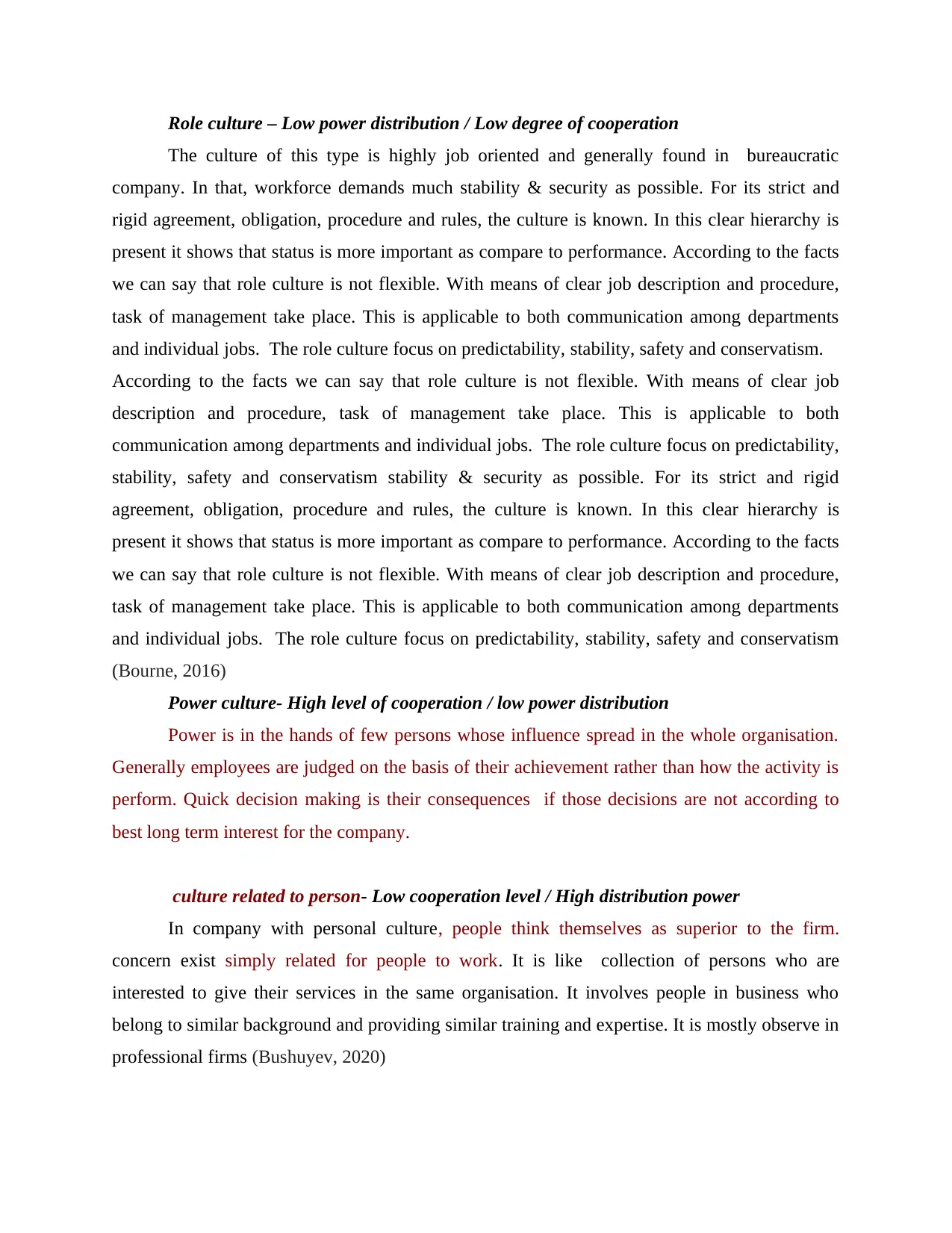
Role culture – Low power distribution / Low degree of cooperation
The culture of this type is highly job oriented and generally found in bureaucratic
company. In that, workforce demands much stability & security as possible. For its strict and
rigid agreement, obligation, procedure and rules, the culture is known. In this clear hierarchy is
present it shows that status is more important as compare to performance. According to the facts
we can say that role culture is not flexible. With means of clear job description and procedure,
task of management take place. This is applicable to both communication among departments
and individual jobs. The role culture focus on predictability, stability, safety and conservatism.
According to the facts we can say that role culture is not flexible. With means of clear job
description and procedure, task of management take place. This is applicable to both
communication among departments and individual jobs. The role culture focus on predictability,
stability, safety and conservatism stability & security as possible. For its strict and rigid
agreement, obligation, procedure and rules, the culture is known. In this clear hierarchy is
present it shows that status is more important as compare to performance. According to the facts
we can say that role culture is not flexible. With means of clear job description and procedure,
task of management take place. This is applicable to both communication among departments
and individual jobs. The role culture focus on predictability, stability, safety and conservatism
(Bourne, 2016)
Power culture- High level of cooperation / low power distribution
Power is in the hands of few persons whose influence spread in the whole organisation.
Generally employees are judged on the basis of their achievement rather than how the activity is
perform. Quick decision making is their consequences if those decisions are not according to
best long term interest for the company.
culture related to person- Low cooperation level / High distribution power
In company with personal culture, people think themselves as superior to the firm.
concern exist simply related for people to work. It is like collection of persons who are
interested to give their services in the same organisation. It involves people in business who
belong to similar background and providing similar training and expertise. It is mostly observe in
professional firms (Bushuyev, 2020)
The culture of this type is highly job oriented and generally found in bureaucratic
company. In that, workforce demands much stability & security as possible. For its strict and
rigid agreement, obligation, procedure and rules, the culture is known. In this clear hierarchy is
present it shows that status is more important as compare to performance. According to the facts
we can say that role culture is not flexible. With means of clear job description and procedure,
task of management take place. This is applicable to both communication among departments
and individual jobs. The role culture focus on predictability, stability, safety and conservatism.
According to the facts we can say that role culture is not flexible. With means of clear job
description and procedure, task of management take place. This is applicable to both
communication among departments and individual jobs. The role culture focus on predictability,
stability, safety and conservatism stability & security as possible. For its strict and rigid
agreement, obligation, procedure and rules, the culture is known. In this clear hierarchy is
present it shows that status is more important as compare to performance. According to the facts
we can say that role culture is not flexible. With means of clear job description and procedure,
task of management take place. This is applicable to both communication among departments
and individual jobs. The role culture focus on predictability, stability, safety and conservatism
(Bourne, 2016)
Power culture- High level of cooperation / low power distribution
Power is in the hands of few persons whose influence spread in the whole organisation.
Generally employees are judged on the basis of their achievement rather than how the activity is
perform. Quick decision making is their consequences if those decisions are not according to
best long term interest for the company.
culture related to person- Low cooperation level / High distribution power
In company with personal culture, people think themselves as superior to the firm.
concern exist simply related for people to work. It is like collection of persons who are
interested to give their services in the same organisation. It involves people in business who
belong to similar background and providing similar training and expertise. It is mostly observe in
professional firms (Bushuyev, 2020)
Paraphrase This Document
Need a fresh take? Get an instant paraphrase of this document with our AI Paraphraser
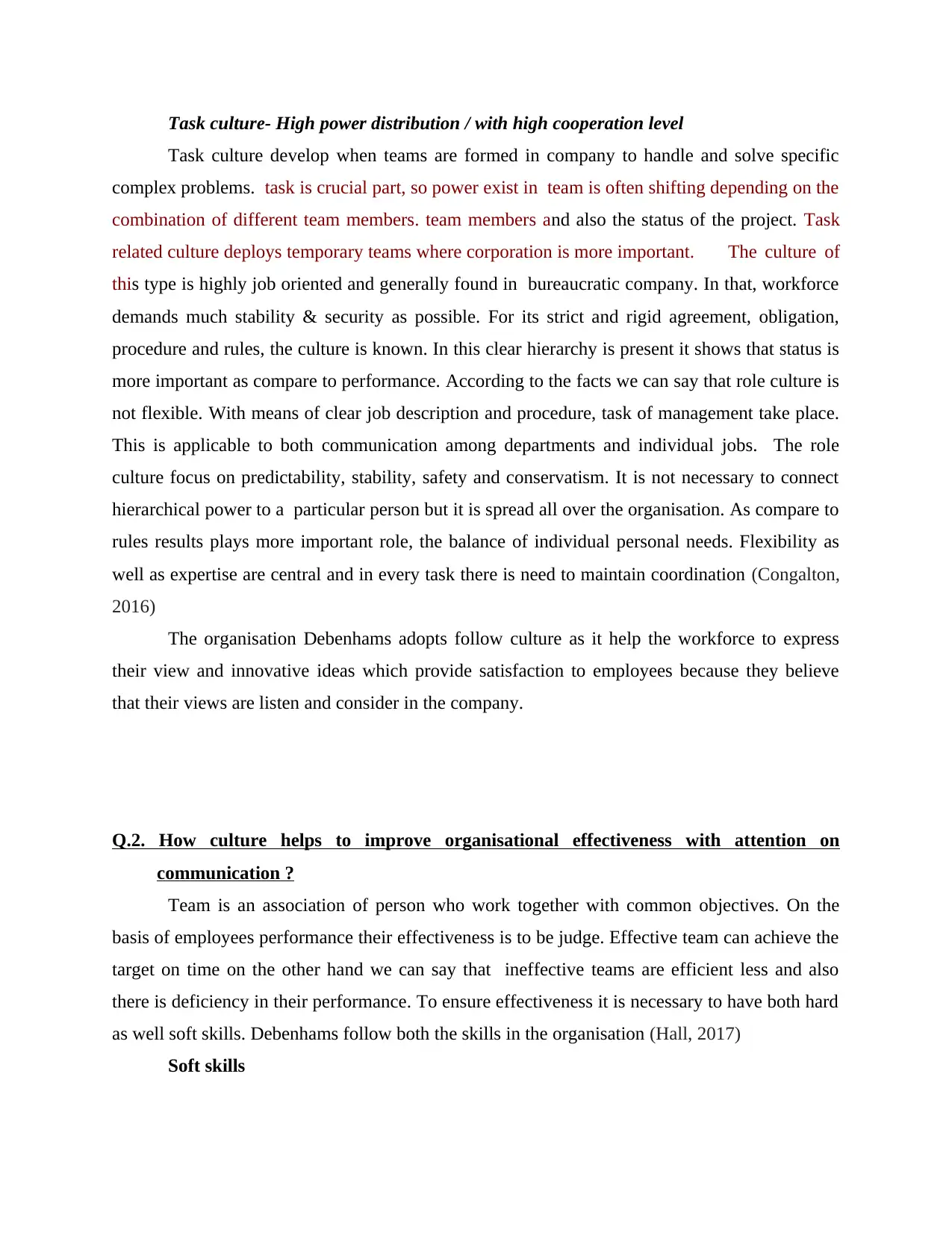
Task culture- High power distribution / with high cooperation level
Task culture develop when teams are formed in company to handle and solve specific
complex problems. task is crucial part, so power exist in team is often shifting depending on the
combination of different team members. team members and also the status of the project. Task
related culture deploys temporary teams where corporation is more important. The culture of
this type is highly job oriented and generally found in bureaucratic company. In that, workforce
demands much stability & security as possible. For its strict and rigid agreement, obligation,
procedure and rules, the culture is known. In this clear hierarchy is present it shows that status is
more important as compare to performance. According to the facts we can say that role culture is
not flexible. With means of clear job description and procedure, task of management take place.
This is applicable to both communication among departments and individual jobs. The role
culture focus on predictability, stability, safety and conservatism. It is not necessary to connect
hierarchical power to a particular person but it is spread all over the organisation. As compare to
rules results plays more important role, the balance of individual personal needs. Flexibility as
well as expertise are central and in every task there is need to maintain coordination (Congalton,
2016)
The organisation Debenhams adopts follow culture as it help the workforce to express
their view and innovative ideas which provide satisfaction to employees because they believe
that their views are listen and consider in the company.
Q.2. How culture helps to improve organisational effectiveness with attention on
communication ?
Team is an association of person who work together with common objectives. On the
basis of employees performance their effectiveness is to be judge. Effective team can achieve the
target on time on the other hand we can say that ineffective teams are efficient less and also
there is deficiency in their performance. To ensure effectiveness it is necessary to have both hard
as well soft skills. Debenhams follow both the skills in the organisation (Hall, 2017)
Soft skills
Task culture develop when teams are formed in company to handle and solve specific
complex problems. task is crucial part, so power exist in team is often shifting depending on the
combination of different team members. team members and also the status of the project. Task
related culture deploys temporary teams where corporation is more important. The culture of
this type is highly job oriented and generally found in bureaucratic company. In that, workforce
demands much stability & security as possible. For its strict and rigid agreement, obligation,
procedure and rules, the culture is known. In this clear hierarchy is present it shows that status is
more important as compare to performance. According to the facts we can say that role culture is
not flexible. With means of clear job description and procedure, task of management take place.
This is applicable to both communication among departments and individual jobs. The role
culture focus on predictability, stability, safety and conservatism. It is not necessary to connect
hierarchical power to a particular person but it is spread all over the organisation. As compare to
rules results plays more important role, the balance of individual personal needs. Flexibility as
well as expertise are central and in every task there is need to maintain coordination (Congalton,
2016)
The organisation Debenhams adopts follow culture as it help the workforce to express
their view and innovative ideas which provide satisfaction to employees because they believe
that their views are listen and consider in the company.
Q.2. How culture helps to improve organisational effectiveness with attention on
communication ?
Team is an association of person who work together with common objectives. On the
basis of employees performance their effectiveness is to be judge. Effective team can achieve the
target on time on the other hand we can say that ineffective teams are efficient less and also
there is deficiency in their performance. To ensure effectiveness it is necessary to have both hard
as well soft skills. Debenhams follow both the skills in the organisation (Hall, 2017)
Soft skills
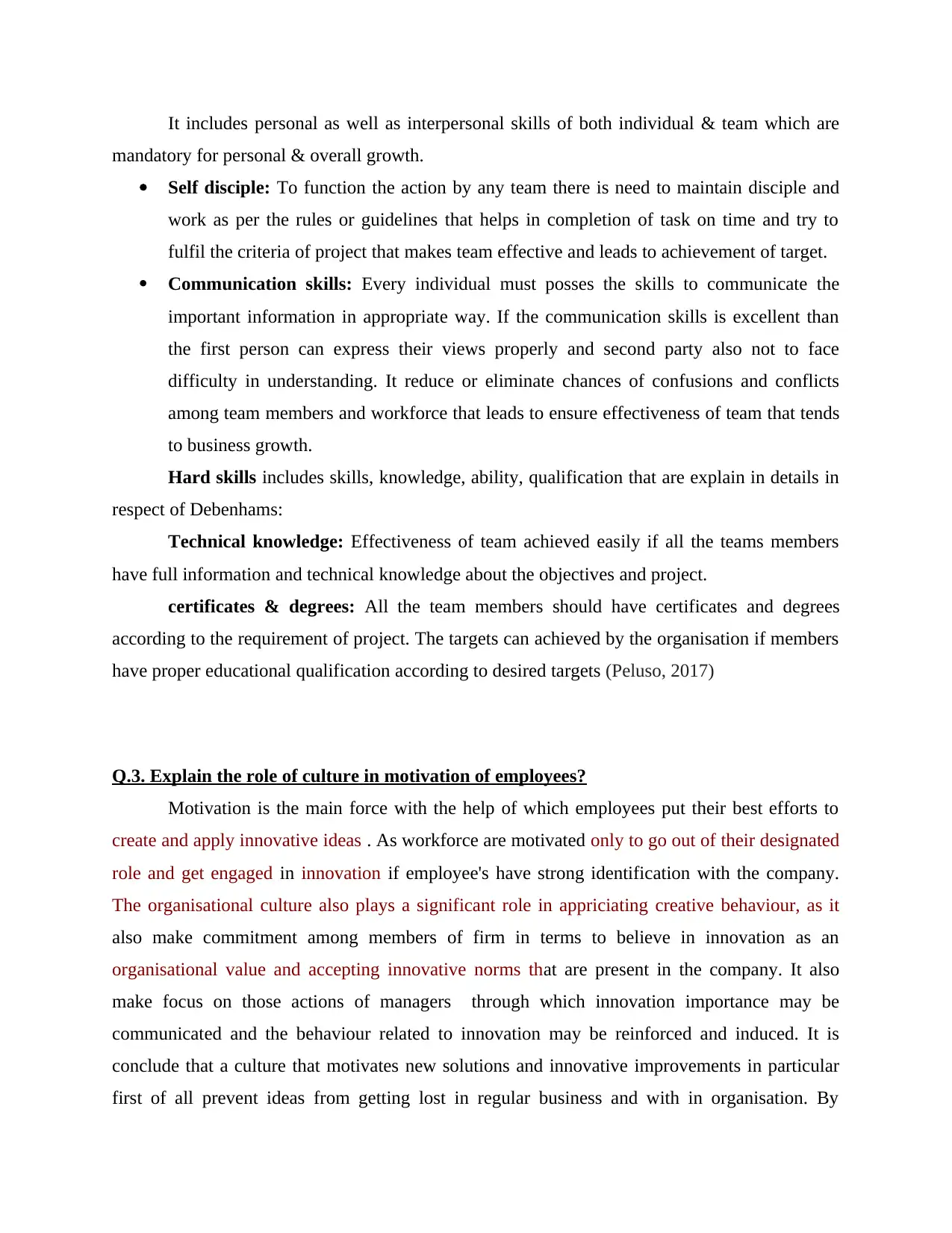
It includes personal as well as interpersonal skills of both individual & team which are
mandatory for personal & overall growth.
Self disciple: To function the action by any team there is need to maintain disciple and
work as per the rules or guidelines that helps in completion of task on time and try to
fulfil the criteria of project that makes team effective and leads to achievement of target.
Communication skills: Every individual must posses the skills to communicate the
important information in appropriate way. If the communication skills is excellent than
the first person can express their views properly and second party also not to face
difficulty in understanding. It reduce or eliminate chances of confusions and conflicts
among team members and workforce that leads to ensure effectiveness of team that tends
to business growth.
Hard skills includes skills, knowledge, ability, qualification that are explain in details in
respect of Debenhams:
Technical knowledge: Effectiveness of team achieved easily if all the teams members
have full information and technical knowledge about the objectives and project.
certificates & degrees: All the team members should have certificates and degrees
according to the requirement of project. The targets can achieved by the organisation if members
have proper educational qualification according to desired targets (Peluso, 2017)
Q.3. Explain the role of culture in motivation of employees?
Motivation is the main force with the help of which employees put their best efforts to
create and apply innovative ideas . As workforce are motivated only to go out of their designated
role and get engaged in innovation if employee's have strong identification with the company.
The organisational culture also plays a significant role in appriciating creative behaviour, as it
also make commitment among members of firm in terms to believe in innovation as an
organisational value and accepting innovative norms that are present in the company. It also
make focus on those actions of managers through which innovation importance may be
communicated and the behaviour related to innovation may be reinforced and induced. It is
conclude that a culture that motivates new solutions and innovative improvements in particular
first of all prevent ideas from getting lost in regular business and with in organisation. By
mandatory for personal & overall growth.
Self disciple: To function the action by any team there is need to maintain disciple and
work as per the rules or guidelines that helps in completion of task on time and try to
fulfil the criteria of project that makes team effective and leads to achievement of target.
Communication skills: Every individual must posses the skills to communicate the
important information in appropriate way. If the communication skills is excellent than
the first person can express their views properly and second party also not to face
difficulty in understanding. It reduce or eliminate chances of confusions and conflicts
among team members and workforce that leads to ensure effectiveness of team that tends
to business growth.
Hard skills includes skills, knowledge, ability, qualification that are explain in details in
respect of Debenhams:
Technical knowledge: Effectiveness of team achieved easily if all the teams members
have full information and technical knowledge about the objectives and project.
certificates & degrees: All the team members should have certificates and degrees
according to the requirement of project. The targets can achieved by the organisation if members
have proper educational qualification according to desired targets (Peluso, 2017)
Q.3. Explain the role of culture in motivation of employees?
Motivation is the main force with the help of which employees put their best efforts to
create and apply innovative ideas . As workforce are motivated only to go out of their designated
role and get engaged in innovation if employee's have strong identification with the company.
The organisational culture also plays a significant role in appriciating creative behaviour, as it
also make commitment among members of firm in terms to believe in innovation as an
organisational value and accepting innovative norms that are present in the company. It also
make focus on those actions of managers through which innovation importance may be
communicated and the behaviour related to innovation may be reinforced and induced. It is
conclude that a culture that motivates new solutions and innovative improvements in particular
first of all prevent ideas from getting lost in regular business and with in organisation. By
⊘ This is a preview!⊘
Do you want full access?
Subscribe today to unlock all pages.

Trusted by 1+ million students worldwide
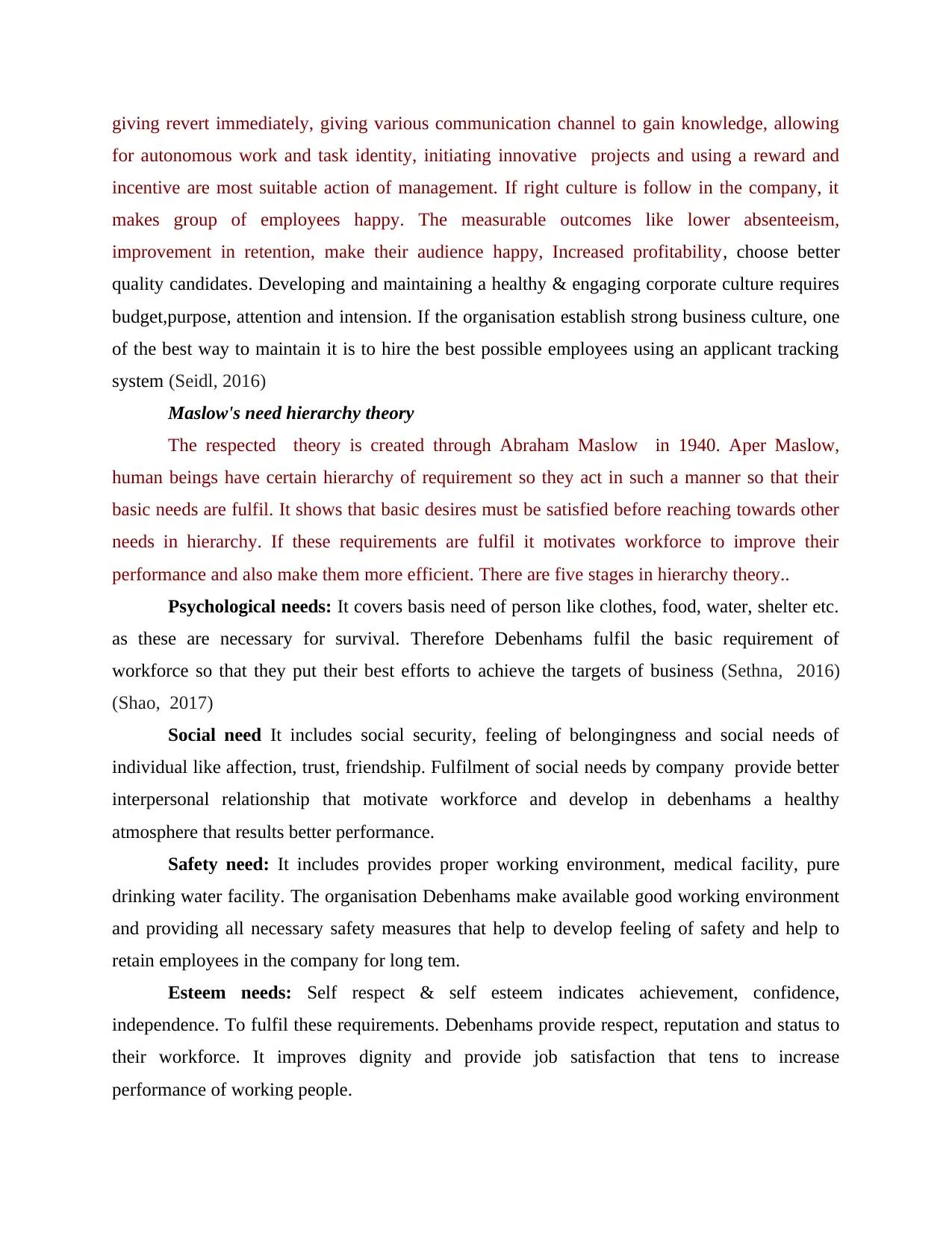
giving revert immediately, giving various communication channel to gain knowledge, allowing
for autonomous work and task identity, initiating innovative projects and using a reward and
incentive are most suitable action of management. If right culture is follow in the company, it
makes group of employees happy. The measurable outcomes like lower absenteeism,
improvement in retention, make their audience happy, Increased profitability, choose better
quality candidates. Developing and maintaining a healthy & engaging corporate culture requires
budget,purpose, attention and intension. If the organisation establish strong business culture, one
of the best way to maintain it is to hire the best possible employees using an applicant tracking
system (Seidl, 2016)
Maslow's need hierarchy theory
The respected theory is created through Abraham Maslow in 1940. Aper Maslow,
human beings have certain hierarchy of requirement so they act in such a manner so that their
basic needs are fulfil. It shows that basic desires must be satisfied before reaching towards other
needs in hierarchy. If these requirements are fulfil it motivates workforce to improve their
performance and also make them more efficient. There are five stages in hierarchy theory..
Psychological needs: It covers basis need of person like clothes, food, water, shelter etc.
as these are necessary for survival. Therefore Debenhams fulfil the basic requirement of
workforce so that they put their best efforts to achieve the targets of business (Sethna, 2016)
(Shao, 2017)
Social need It includes social security, feeling of belongingness and social needs of
individual like affection, trust, friendship. Fulfilment of social needs by company provide better
interpersonal relationship that motivate workforce and develop in debenhams a healthy
atmosphere that results better performance.
Safety need: It includes provides proper working environment, medical facility, pure
drinking water facility. The organisation Debenhams make available good working environment
and providing all necessary safety measures that help to develop feeling of safety and help to
retain employees in the company for long tem.
Esteem needs: Self respect & self esteem indicates achievement, confidence,
independence. To fulfil these requirements. Debenhams provide respect, reputation and status to
their workforce. It improves dignity and provide job satisfaction that tens to increase
performance of working people.
for autonomous work and task identity, initiating innovative projects and using a reward and
incentive are most suitable action of management. If right culture is follow in the company, it
makes group of employees happy. The measurable outcomes like lower absenteeism,
improvement in retention, make their audience happy, Increased profitability, choose better
quality candidates. Developing and maintaining a healthy & engaging corporate culture requires
budget,purpose, attention and intension. If the organisation establish strong business culture, one
of the best way to maintain it is to hire the best possible employees using an applicant tracking
system (Seidl, 2016)
Maslow's need hierarchy theory
The respected theory is created through Abraham Maslow in 1940. Aper Maslow,
human beings have certain hierarchy of requirement so they act in such a manner so that their
basic needs are fulfil. It shows that basic desires must be satisfied before reaching towards other
needs in hierarchy. If these requirements are fulfil it motivates workforce to improve their
performance and also make them more efficient. There are five stages in hierarchy theory..
Psychological needs: It covers basis need of person like clothes, food, water, shelter etc.
as these are necessary for survival. Therefore Debenhams fulfil the basic requirement of
workforce so that they put their best efforts to achieve the targets of business (Sethna, 2016)
(Shao, 2017)
Social need It includes social security, feeling of belongingness and social needs of
individual like affection, trust, friendship. Fulfilment of social needs by company provide better
interpersonal relationship that motivate workforce and develop in debenhams a healthy
atmosphere that results better performance.
Safety need: It includes provides proper working environment, medical facility, pure
drinking water facility. The organisation Debenhams make available good working environment
and providing all necessary safety measures that help to develop feeling of safety and help to
retain employees in the company for long tem.
Esteem needs: Self respect & self esteem indicates achievement, confidence,
independence. To fulfil these requirements. Debenhams provide respect, reputation and status to
their workforce. It improves dignity and provide job satisfaction that tens to increase
performance of working people.
Paraphrase This Document
Need a fresh take? Get an instant paraphrase of this document with our AI Paraphraser
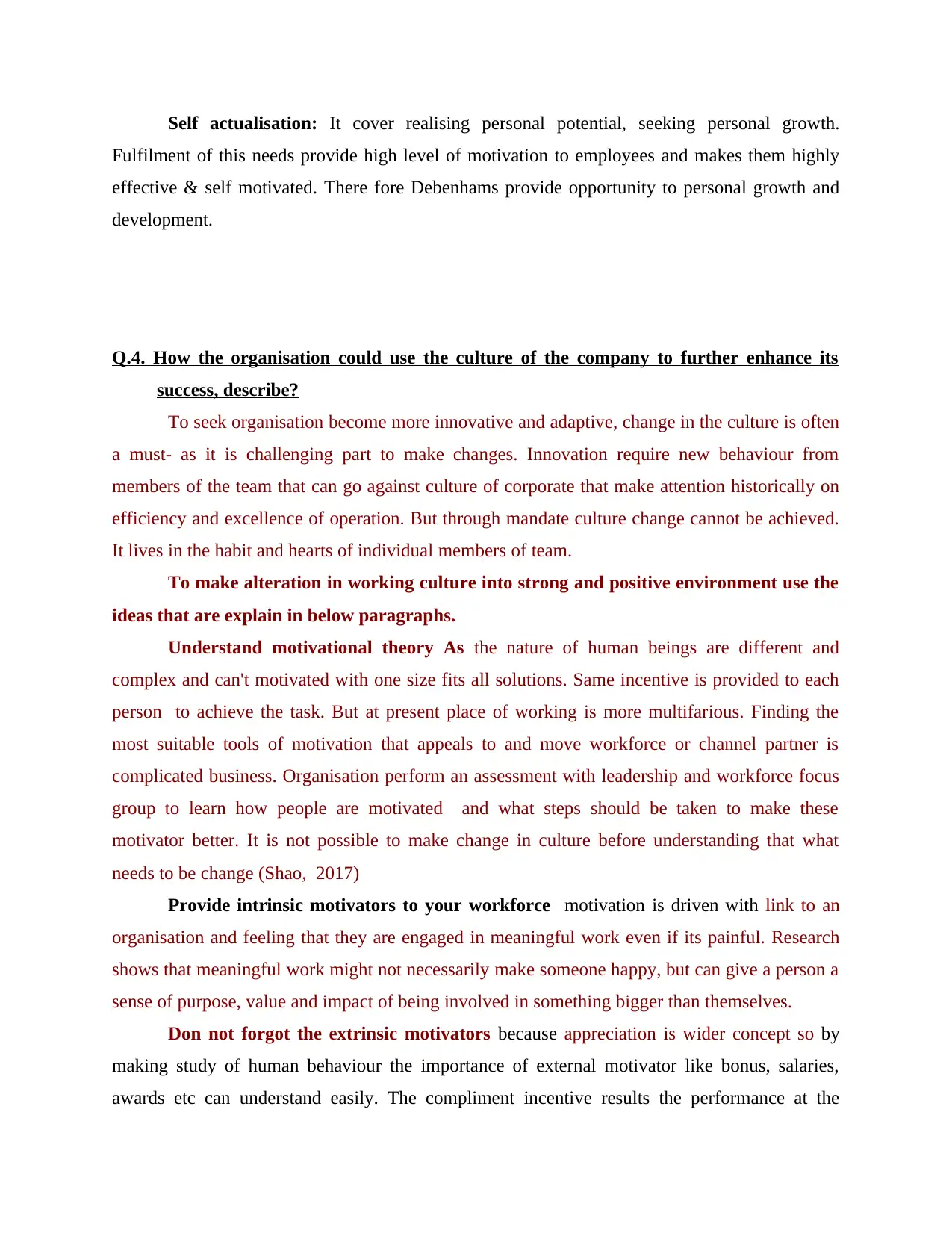
Self actualisation: It cover realising personal potential, seeking personal growth.
Fulfilment of this needs provide high level of motivation to employees and makes them highly
effective & self motivated. There fore Debenhams provide opportunity to personal growth and
development.
Q.4. How the organisation could use the culture of the company to further enhance its
success, describe?
To seek organisation become more innovative and adaptive, change in the culture is often
a must- as it is challenging part to make changes. Innovation require new behaviour from
members of the team that can go against culture of corporate that make attention historically on
efficiency and excellence of operation. But through mandate culture change cannot be achieved.
It lives in the habit and hearts of individual members of team.
To make alteration in working culture into strong and positive environment use the
ideas that are explain in below paragraphs.
Understand motivational theory As the nature of human beings are different and
complex and can't motivated with one size fits all solutions. Same incentive is provided to each
person to achieve the task. But at present place of working is more multifarious. Finding the
most suitable tools of motivation that appeals to and move workforce or channel partner is
complicated business. Organisation perform an assessment with leadership and workforce focus
group to learn how people are motivated and what steps should be taken to make these
motivator better. It is not possible to make change in culture before understanding that what
needs to be change (Shao, 2017)
Provide intrinsic motivators to your workforce motivation is driven with link to an
organisation and feeling that they are engaged in meaningful work even if its painful. Research
shows that meaningful work might not necessarily make someone happy, but can give a person a
sense of purpose, value and impact of being involved in something bigger than themselves.
Don not forgot the extrinsic motivators because appreciation is wider concept so by
making study of human behaviour the importance of external motivator like bonus, salaries,
awards etc can understand easily. The compliment incentive results the performance at the
Fulfilment of this needs provide high level of motivation to employees and makes them highly
effective & self motivated. There fore Debenhams provide opportunity to personal growth and
development.
Q.4. How the organisation could use the culture of the company to further enhance its
success, describe?
To seek organisation become more innovative and adaptive, change in the culture is often
a must- as it is challenging part to make changes. Innovation require new behaviour from
members of the team that can go against culture of corporate that make attention historically on
efficiency and excellence of operation. But through mandate culture change cannot be achieved.
It lives in the habit and hearts of individual members of team.
To make alteration in working culture into strong and positive environment use the
ideas that are explain in below paragraphs.
Understand motivational theory As the nature of human beings are different and
complex and can't motivated with one size fits all solutions. Same incentive is provided to each
person to achieve the task. But at present place of working is more multifarious. Finding the
most suitable tools of motivation that appeals to and move workforce or channel partner is
complicated business. Organisation perform an assessment with leadership and workforce focus
group to learn how people are motivated and what steps should be taken to make these
motivator better. It is not possible to make change in culture before understanding that what
needs to be change (Shao, 2017)
Provide intrinsic motivators to your workforce motivation is driven with link to an
organisation and feeling that they are engaged in meaningful work even if its painful. Research
shows that meaningful work might not necessarily make someone happy, but can give a person a
sense of purpose, value and impact of being involved in something bigger than themselves.
Don not forgot the extrinsic motivators because appreciation is wider concept so by
making study of human behaviour the importance of external motivator like bonus, salaries,
awards etc can understand easily. The compliment incentive results the performance at the
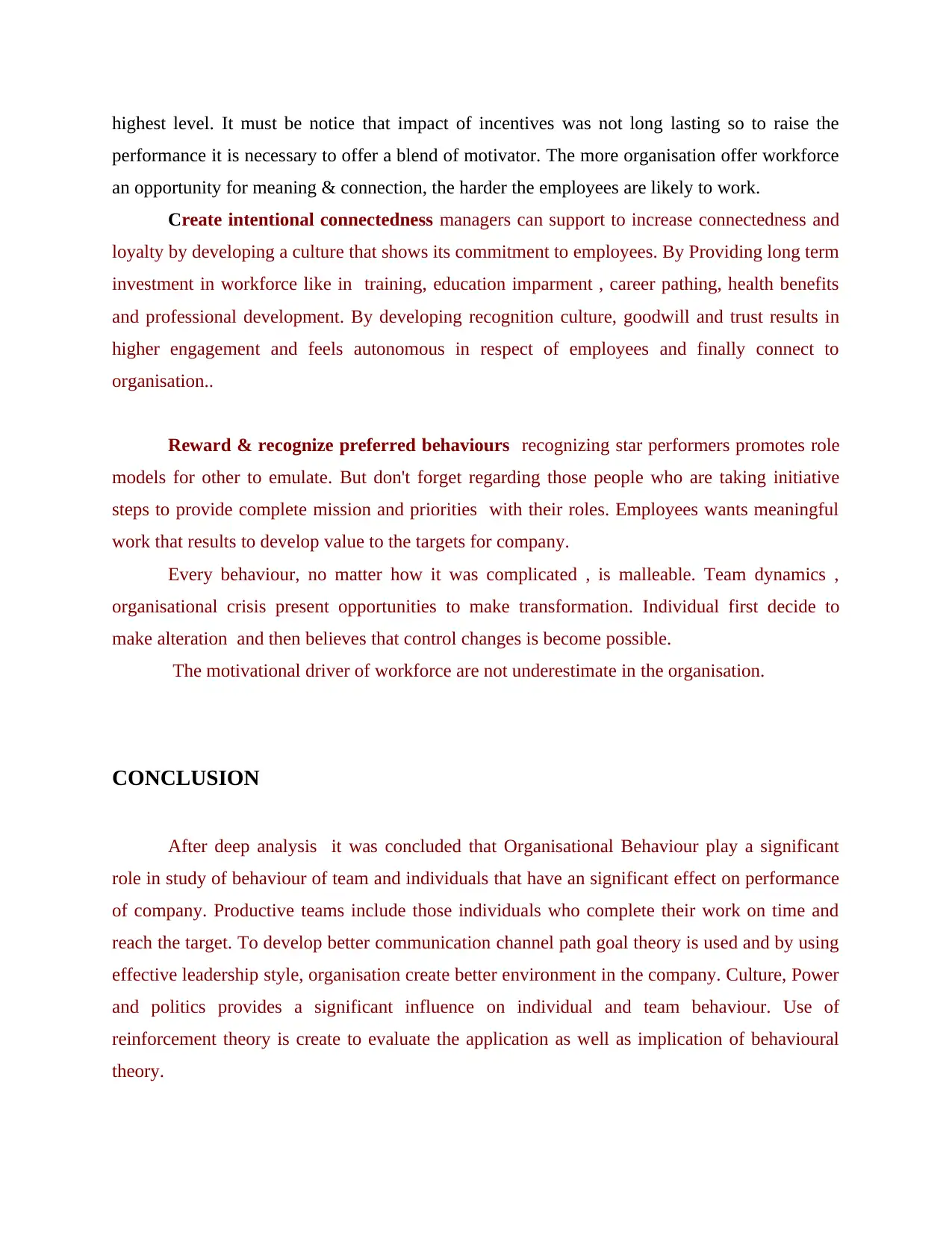
highest level. It must be notice that impact of incentives was not long lasting so to raise the
performance it is necessary to offer a blend of motivator. The more organisation offer workforce
an opportunity for meaning & connection, the harder the employees are likely to work.
Create intentional connectedness managers can support to increase connectedness and
loyalty by developing a culture that shows its commitment to employees. By Providing long term
investment in workforce like in training, education imparment , career pathing, health benefits
and professional development. By developing recognition culture, goodwill and trust results in
higher engagement and feels autonomous in respect of employees and finally connect to
organisation..
Reward & recognize preferred behaviours recognizing star performers promotes role
models for other to emulate. But don't forget regarding those people who are taking initiative
steps to provide complete mission and priorities with their roles. Employees wants meaningful
work that results to develop value to the targets for company.
Every behaviour, no matter how it was complicated , is malleable. Team dynamics ,
organisational crisis present opportunities to make transformation. Individual first decide to
make alteration and then believes that control changes is become possible.
The motivational driver of workforce are not underestimate in the organisation.
CONCLUSION
After deep analysis it was concluded that Organisational Behaviour play a significant
role in study of behaviour of team and individuals that have an significant effect on performance
of company. Productive teams include those individuals who complete their work on time and
reach the target. To develop better communication channel path goal theory is used and by using
effective leadership style, organisation create better environment in the company. Culture, Power
and politics provides a significant influence on individual and team behaviour. Use of
reinforcement theory is create to evaluate the application as well as implication of behavioural
theory.
performance it is necessary to offer a blend of motivator. The more organisation offer workforce
an opportunity for meaning & connection, the harder the employees are likely to work.
Create intentional connectedness managers can support to increase connectedness and
loyalty by developing a culture that shows its commitment to employees. By Providing long term
investment in workforce like in training, education imparment , career pathing, health benefits
and professional development. By developing recognition culture, goodwill and trust results in
higher engagement and feels autonomous in respect of employees and finally connect to
organisation..
Reward & recognize preferred behaviours recognizing star performers promotes role
models for other to emulate. But don't forget regarding those people who are taking initiative
steps to provide complete mission and priorities with their roles. Employees wants meaningful
work that results to develop value to the targets for company.
Every behaviour, no matter how it was complicated , is malleable. Team dynamics ,
organisational crisis present opportunities to make transformation. Individual first decide to
make alteration and then believes that control changes is become possible.
The motivational driver of workforce are not underestimate in the organisation.
CONCLUSION
After deep analysis it was concluded that Organisational Behaviour play a significant
role in study of behaviour of team and individuals that have an significant effect on performance
of company. Productive teams include those individuals who complete their work on time and
reach the target. To develop better communication channel path goal theory is used and by using
effective leadership style, organisation create better environment in the company. Culture, Power
and politics provides a significant influence on individual and team behaviour. Use of
reinforcement theory is create to evaluate the application as well as implication of behavioural
theory.
⊘ This is a preview!⊘
Do you want full access?
Subscribe today to unlock all pages.

Trusted by 1+ million students worldwide
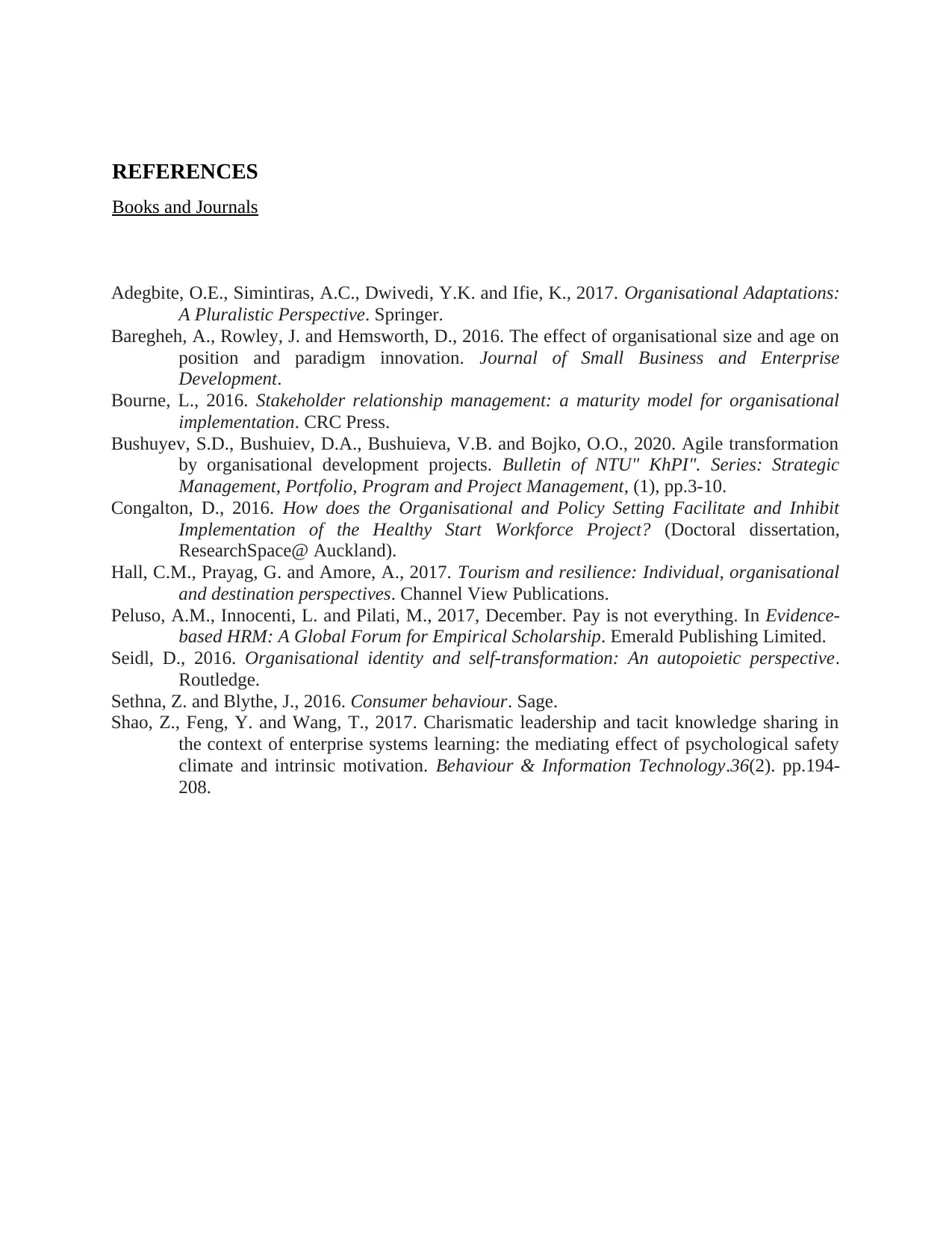
REFERENCES
Books and Journals
Adegbite, O.E., Simintiras, A.C., Dwivedi, Y.K. and Ifie, K., 2017. Organisational Adaptations:
A Pluralistic Perspective. Springer.
Baregheh, A., Rowley, J. and Hemsworth, D., 2016. The effect of organisational size and age on
position and paradigm innovation. Journal of Small Business and Enterprise
Development.
Bourne, L., 2016. Stakeholder relationship management: a maturity model for organisational
implementation. CRC Press.
Bushuyev, S.D., Bushuiev, D.A., Bushuieva, V.B. and Bojko, O.O., 2020. Agile transformation
by organisational development projects. Bulletin of NTU" KhPI". Series: Strategic
Management, Portfolio, Program and Project Management, (1), pp.3-10.
Congalton, D., 2016. How does the Organisational and Policy Setting Facilitate and Inhibit
Implementation of the Healthy Start Workforce Project? (Doctoral dissertation,
ResearchSpace@ Auckland).
Hall, C.M., Prayag, G. and Amore, A., 2017. Tourism and resilience: Individual, organisational
and destination perspectives. Channel View Publications.
Peluso, A.M., Innocenti, L. and Pilati, M., 2017, December. Pay is not everything. In Evidence-
based HRM: A Global Forum for Empirical Scholarship. Emerald Publishing Limited.
Seidl, D., 2016. Organisational identity and self-transformation: An autopoietic perspective.
Routledge.
Sethna, Z. and Blythe, J., 2016. Consumer behaviour. Sage.
Shao, Z., Feng, Y. and Wang, T., 2017. Charismatic leadership and tacit knowledge sharing in
the context of enterprise systems learning: the mediating effect of psychological safety
climate and intrinsic motivation. Behaviour & Information Technology.36(2). pp.194-
208.
Books and Journals
Adegbite, O.E., Simintiras, A.C., Dwivedi, Y.K. and Ifie, K., 2017. Organisational Adaptations:
A Pluralistic Perspective. Springer.
Baregheh, A., Rowley, J. and Hemsworth, D., 2016. The effect of organisational size and age on
position and paradigm innovation. Journal of Small Business and Enterprise
Development.
Bourne, L., 2016. Stakeholder relationship management: a maturity model for organisational
implementation. CRC Press.
Bushuyev, S.D., Bushuiev, D.A., Bushuieva, V.B. and Bojko, O.O., 2020. Agile transformation
by organisational development projects. Bulletin of NTU" KhPI". Series: Strategic
Management, Portfolio, Program and Project Management, (1), pp.3-10.
Congalton, D., 2016. How does the Organisational and Policy Setting Facilitate and Inhibit
Implementation of the Healthy Start Workforce Project? (Doctoral dissertation,
ResearchSpace@ Auckland).
Hall, C.M., Prayag, G. and Amore, A., 2017. Tourism and resilience: Individual, organisational
and destination perspectives. Channel View Publications.
Peluso, A.M., Innocenti, L. and Pilati, M., 2017, December. Pay is not everything. In Evidence-
based HRM: A Global Forum for Empirical Scholarship. Emerald Publishing Limited.
Seidl, D., 2016. Organisational identity and self-transformation: An autopoietic perspective.
Routledge.
Sethna, Z. and Blythe, J., 2016. Consumer behaviour. Sage.
Shao, Z., Feng, Y. and Wang, T., 2017. Charismatic leadership and tacit knowledge sharing in
the context of enterprise systems learning: the mediating effect of psychological safety
climate and intrinsic motivation. Behaviour & Information Technology.36(2). pp.194-
208.
1 out of 10
Related Documents
Your All-in-One AI-Powered Toolkit for Academic Success.
+13062052269
info@desklib.com
Available 24*7 on WhatsApp / Email
![[object Object]](/_next/static/media/star-bottom.7253800d.svg)
Unlock your academic potential
Copyright © 2020–2026 A2Z Services. All Rights Reserved. Developed and managed by ZUCOL.





